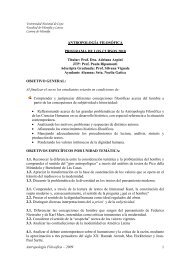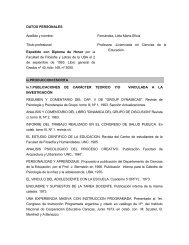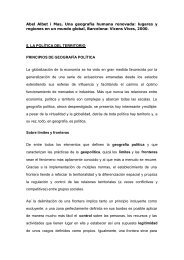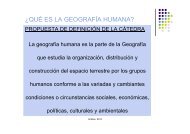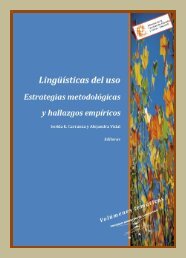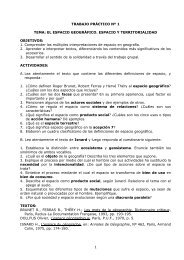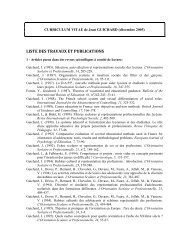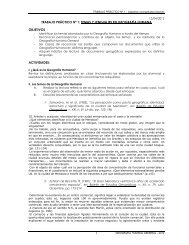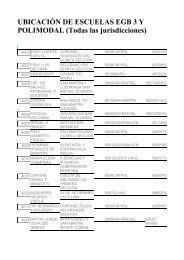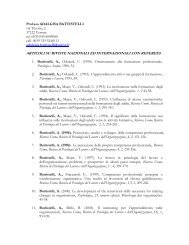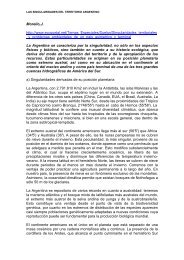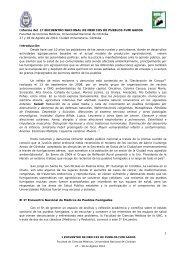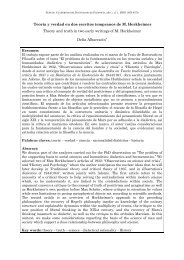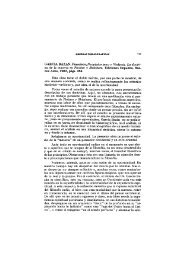- Page 1 and 2:
Volumen 25/26 Años 2008/2009 Anuar
- Page 3:
CUYO Anuario de Filosofía Argentin
- Page 6 and 7:
CUYO es una publicación anual del
- Page 8 and 9:
○ ○ ○ ○ ○ ○ ○ ○ ○
- Page 10 and 11:
8 Adriana Aída García, Guardar me
- Page 12 and 13:
10 Adriana Aída García, Guardar m
- Page 14 and 15:
12 Adriana Aída García, Guardar m
- Page 17:
Artículos
- Page 20 and 21:
18 Juan Carlos Torchia estrada, La
- Page 22 and 23:
20 Juan Carlos Torchia estrada, La
- Page 24 and 25:
22 Juan Carlos Torchia estrada, La
- Page 26 and 27:
24 Juan Carlos Torchia estrada, La
- Page 28 and 29:
26 Juan Carlos Torchia estrada, La
- Page 30 and 31:
28 Juan Carlos Torchia estrada, La
- Page 32 and 33:
30 Juan Carlos Torchia estrada, La
- Page 34 and 35:
32 Juan Carlos Torchia estrada, La
- Page 36 and 37:
34 Juan Carlos Torchia estrada, La
- Page 38 and 39:
36 Juan Carlos Torchia estrada, La
- Page 40 and 41:
38 Juan Carlos Torchia estrada, La
- Page 42 and 43:
40 Juan Carlos Torchia estrada, La
- Page 44 and 45:
42 Juan Carlos Torchia estrada, La
- Page 46 and 47:
44 Juan Carlos Torchia estrada, La
- Page 48 and 49:
46 Juan Carlos Torchia estrada, La
- Page 50 and 51:
48 Juan Carlos Torchia estrada, La
- Page 52 and 53:
50 Juan Carlos Torchia estrada, La
- Page 54 and 55:
52 Juan Carlos Torchia estrada, La
- Page 56 and 57:
54 Juan Carlos Torchia estrada, La
- Page 58 and 59:
56 Juan Carlos Torchia estrada, La
- Page 61 and 62:
Cuyo. Anuario de Filosofía Argenti
- Page 63 and 64:
Cuyo. Anuario de Filosofía Argenti
- Page 65 and 66:
Cuyo. Anuario de Filosofía Argenti
- Page 67 and 68:
Cuyo. Anuario de Filosofía Argenti
- Page 69 and 70:
Cuyo. Anuario de Filosofía Argenti
- Page 71 and 72:
Cuyo. Anuario de Filosofía Argenti
- Page 73 and 74:
Cuyo. Anuario de Filosofía Argenti
- Page 75 and 76:
Cuyo. Anuario de Filosofía Argenti
- Page 77 and 78:
Cuyo. Anuario de Filosofía Argenti
- Page 79 and 80:
Cuyo. Anuario de Filosofía Argenti
- Page 81 and 82:
Cuyo. Anuario de Filosofía Argenti
- Page 83 and 84:
Cuyo. Anuario de Filosofía Argenti
- Page 85 and 86:
Cuyo. Anuario de Filosofía Argenti
- Page 87 and 88:
Cuyo. Anuario de Filosofía Argenti
- Page 89 and 90:
Cuyo. Anuario de Filosofía Argenti
- Page 91 and 92:
Cuyo. Anuario de Filosofía Argenti
- Page 93 and 94:
Cuyo. Anuario de Filosofía Argenti
- Page 95 and 96:
Cuyo. Anuario de Filosofía Argenti
- Page 97 and 98:
Cuyo. Anuario de Filosofía Argenti
- Page 99 and 100:
Cuyo. Anuario de Filosofía Argenti
- Page 101 and 102:
Cuyo. Anuario de Filosofía Argenti
- Page 103 and 104:
Cuyo. Anuario de Filosofía Argenti
- Page 105 and 106:
Cuyo. Anuario de Filosofía Argenti
- Page 107 and 108:
Cuyo. Anuario de Filosofía Argenti
- Page 109 and 110:
Cuyo. Anuario de Filosofía Argenti
- Page 111 and 112:
Cuyo. Anuario de Filosofía Argenti
- Page 113 and 114:
Cuyo. Anuario de Filosofía Argenti
- Page 115 and 116:
Cuyo. Anuario de Filosofía Argenti
- Page 117 and 118: Cuyo. Anuario de Filosofía Argenti
- Page 119 and 120: Cuyo. Anuario de Filosofía Argenti
- Page 121 and 122: Cuyo. Anuario de Filosofía Argenti
- Page 123 and 124: Cuyo. Anuario de Filosofía Argenti
- Page 125 and 126: Cuyo. Anuario de Filosofía Argenti
- Page 127 and 128: Cuyo. Anuario de Filosofía Argenti
- Page 129 and 130: Cuyo. Anuario de Filosofía Argenti
- Page 131 and 132: Cuyo. Anuario de Filosofía Argenti
- Page 133 and 134: Cuyo. Anuario de Filosofía Argenti
- Page 135 and 136: Cuyo. Anuario de Filosofía Argenti
- Page 137 and 138: Cuyo. Anuario de Filosofía Argenti
- Page 139 and 140: Cuyo. Anuario de Filosofía Argenti
- Page 141 and 142: Cuyo. Anuario de Filosofía Argenti
- Page 143 and 144: Cuyo. Anuario de Filosofía Argenti
- Page 145 and 146: Cuyo. Anuario de Filosofía Argenti
- Page 147 and 148: Cuyo. Anuario de Filosofía Argenti
- Page 149 and 150: Cuyo. Anuario de Filosofía Argenti
- Page 151 and 152: Cuyo. Anuario de Filosofía Argenti
- Page 153 and 154: Cuyo. Anuario de Filosofía Argenti
- Page 155 and 156: Cuyo. Anuario de Filosofía Argenti
- Page 157 and 158: Cuyo. Anuario de Filosofía Argenti
- Page 159 and 160: Cuyo. Anuario de Filosofía Argenti
- Page 161 and 162: Cuyo. Anuario de Filosofía Argenti
- Page 163 and 164: Cuyo. Anuario de Filosofía Argenti
- Page 165 and 166: Cuyo. Anuario de Filosofía Argenti
- Page 167: Cuyo. Anuario de Filosofía Argenti
- Page 171 and 172: Cuyo. Anuario de Filosofía Argenti
- Page 173 and 174: Cuyo. Anuario de Filosofía Argenti
- Page 175 and 176: Cuyo. Anuario de Filosofía Argenti
- Page 177 and 178: Cuyo. Anuario de Filosofía Argenti
- Page 179 and 180: Cuyo. Anuario de Filosofía Argenti
- Page 181 and 182: Cuyo. Anuario de Filosofía Argenti
- Page 183 and 184: Cuyo. Anuario de Filosofía Argenti
- Page 185 and 186: Cuyo. Anuario de Filosofía Argenti
- Page 187 and 188: Cuyo. Anuario de Filosofía Argenti
- Page 189 and 190: Cuyo. Anuario de Filosofía Argenti
- Page 191 and 192: Cuyo. Anuario de Filosofía Argenti
- Page 193 and 194: Cuyo. Anuario de Filosofía Argenti
- Page 195 and 196: Cuyo. Anuario de Filosofía Argenti
- Page 197 and 198: Cuyo. Anuario de Filosofía Argenti
- Page 199 and 200: Cuyo. Anuario de Filosofía Argenti
- Page 201 and 202: Cuyo. Anuario de Filosofía Argenti
- Page 203 and 204: Cuyo. Anuario de Filosofía Argenti
- Page 205 and 206: Cuyo. Anuario de Filosofía Argenti
- Page 207 and 208: Cuyo. Anuario de Filosofía Argenti
- Page 209 and 210: Cuyo. Anuario de Filosofía Argenti
- Page 211 and 212: Cuyo. Anuario de Filosofía Argenti
- Page 213 and 214: Cuyo. Anuario de Filosofía Argenti
- Page 215 and 216: Cuyo. Anuario de Filosofía Argenti
- Page 217 and 218: Cuyo. Anuario de Filosofía Argenti
- Page 219 and 220:
Cuyo. Anuario de Filosofía Argenti
- Page 221 and 222:
Cuyo. Anuario de Filosofía Argenti
- Page 223 and 224:
Cuyo. Anuario de Filosofía Argenti
- Page 225 and 226:
Cuyo. Anuario de Filosofía Argenti
- Page 227 and 228:
Cuyo. Anuario de Filosofía Argenti
- Page 229 and 230:
Cuyo. Anuario de Filosofía Argenti
- Page 231 and 232:
Cuyo. Anuario de Filosofía Argenti
- Page 233 and 234:
Cuyo. Anuario de Filosofía Argenti
- Page 235 and 236:
Cuyo. Anuario de Filosofía Argenti
- Page 237 and 238:
Cuyo. Anuario de Filosofía Argenti
- Page 239 and 240:
Cuyo. Anuario de Filosofía Argenti
- Page 241 and 242:
Cuyo. Anuario de Filosofía Argenti
- Page 243 and 244:
Cuyo. Anuario de Filosofía Argenti
- Page 245 and 246:
Cuyo. Anuario de Filosofía Argenti
- Page 247:
textos
- Page 250 and 251:
248 Mariana Alvarado, Naturaleza in
- Page 252 and 253:
250 Mariana Alvarado, Naturaleza in
- Page 254 and 255:
252 Mariana Alvarado, Naturaleza in
- Page 256 and 257:
254 Mariana Alvarado, Naturaleza in
- Page 258 and 259:
256 Mariana Alvarado, Naturaleza in
- Page 260 and 261:
258 Mariana Alvarado, Naturaleza in
- Page 262 and 263:
260 Mariana Alvarado, Naturaleza in
- Page 264 and 265:
262 Mariana Alvarado, Naturaleza in
- Page 266 and 267:
264 Mariana Alvarado, Naturaleza in
- Page 268 and 269:
266 Mariana Alvarado, Naturaleza in
- Page 270 and 271:
268 Mariana Alvarado, Naturaleza in
- Page 272 and 273:
270 Mariana Alvarado, Naturaleza in
- Page 274 and 275:
272 Mariana Alvarado, Naturaleza in
- Page 276 and 277:
274 Mariana Alvarado, Naturaleza in
- Page 278 and 279:
276 Mariana Alvarado, Naturaleza in
- Page 280 and 281:
278 Mariana Alvarado, Naturaleza in
- Page 282 and 283:
280 Mariana Alvarado, Naturaleza in
- Page 284 and 285:
282 Mariana Alvarado, Naturaleza in
- Page 286 and 287:
284 Mariana Alvarado, Naturaleza in
- Page 288 and 289:
286 Mariana Alvarado, Naturaleza in
- Page 290 and 291:
288 Mariana Alvarado, Naturaleza in
- Page 292 and 293:
290 Mariana Alvarado, Naturaleza in
- Page 294 and 295:
292 Mariana Alvarado, Naturaleza in
- Page 296 and 297:
294 Mariana Alvarado, Naturaleza in
- Page 298 and 299:
296 Mariana Alvarado, Naturaleza in
- Page 300 and 301:
298 Mariana Alvarado, Naturaleza in
- Page 302 and 303:
300 Mariana Alvarado, Naturaleza in
- Page 304 and 305:
302 Mariana Alvarado, Naturaleza in
- Page 306 and 307:
304 Mariana Alvarado, Naturaleza in
- Page 308 and 309:
306 Mariana Alvarado, Naturaleza in
- Page 311 and 312:
Cuyo. Anuario de Filosofía Argenti
- Page 313:
Cuyo. Anuario de Filosofía Argenti
- Page 316 and 317:
314 Silvana Vignale, Biagini Hugo E
- Page 318 and 319:
316 Silvana Vignale, Biagini Hugo E
- Page 321 and 322:
Cuyo. Anuario de Filosofía Argenti
- Page 323 and 324:
CUYO Anuario de Filosofía Argentin
- Page 325 and 326:
nuevas Normas de citación que regi
- Page 327 and 328:
Capítulo u otra parte de un libro
- Page 329:
Contenidos 70 años de la Facultad



